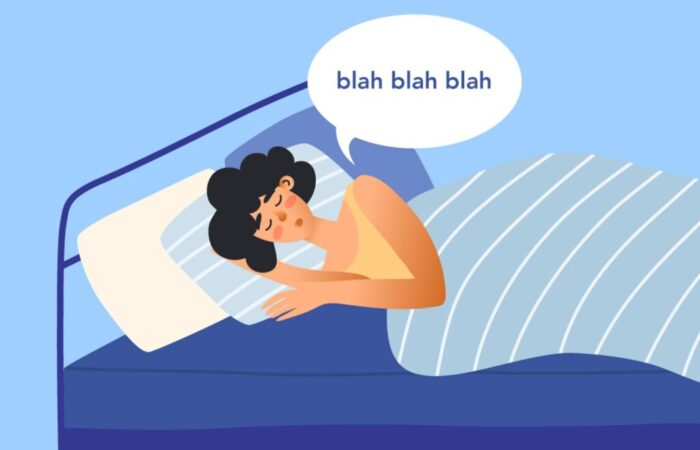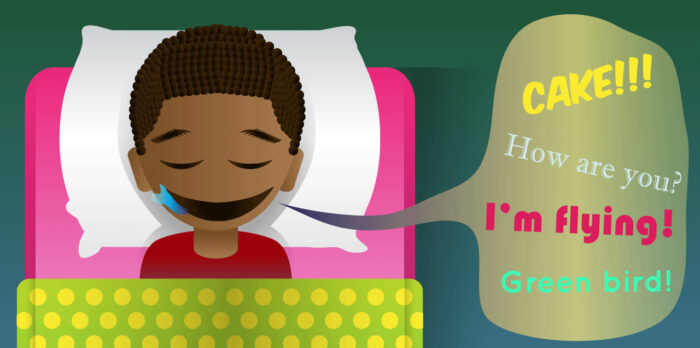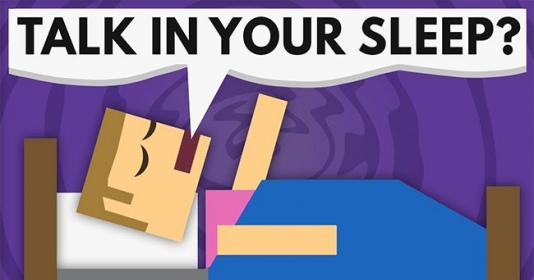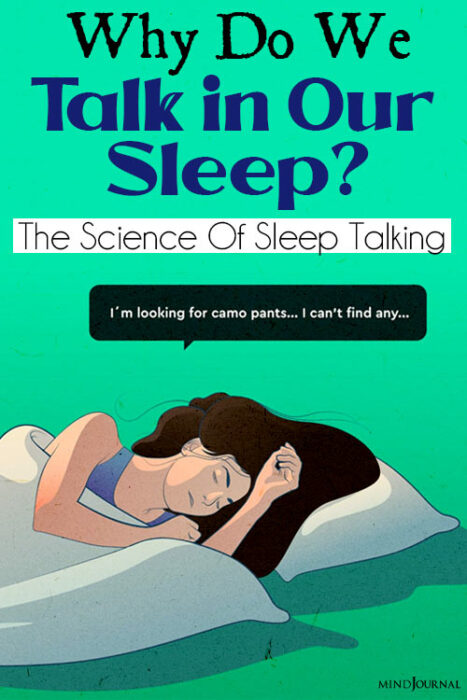Has your partner or family member ever told you that you talk in your sleep? Or have you ever woken up to the sound of your own voice, realizing you’ve been talking in your sleep? Sleep talking is a curious, intriguing and puzzling phenomenon. But what causes you to talk in your sleep?
Today, we will delve into the world of sleep talking, exploring the signs of sleep talking, its causes, the spiritual meaning of sleep talking, and delve into effective strategies on how to stop sleep talking. So, let’s dive deep into this nocturnal exploration.
What is Sleep Talking?
Sleep talking, also known as somniloquy, is a fascinating sleep disorder that can range from simple mumbling to full-blown conversations. It is a form of parasomnia, a category of sleep disorders characterized by abnormal behaviors or experiences during sleep.

“Sleep talking (ST) is characterized by the production of unaware verbal vocal activations (VBs) during sleep,” explains a 2022 study. It has been observed that this phenomenon is potentially associated with “linguistic and memory consolidation processes.”
Unlike nightmares or sleepwalking, sleep talking specifically involves vocal sounds or words uttered during sleep, often without the sleeper’s conscious awareness. It can occur at any stage of sleep and can vary in intensity and coherence.
But what causes you to talk in your sleep? Before we delve into the contributing factors and understand the spiritual meaning of sleep talking, let us first learn about the signs of sleep talking.
Related: Overthinking Before Sleep? 8 Ways To Avoid Racing Thoughts At Night And Sleep Better
9 Signs of Sleep Talking That You Can’t Miss
Curious about the signs that may indicate you are a sleep talker? Here are some of the most common telltale signs of sleep talking that can help you decode this nocturnal mystery –
1. Vocalizations
Sleep talkers often make verbal sounds ranging from incoherent mumbling & muttering to clear and understandable speech while asleep.
2. Incoherent Speech
Apart from fully articulated sentences, the content of sleep talking can also be nonsensical or unrelated to waking life, indicating a lack of conscious control over speech.
3. Repetitive Phrases
Sleep talkers may repeat certain words or phrases, sometimes in a rhythmic manner, without apparent awareness.
4. Emotional Expressions
Sleep talking can reflect emotions experienced during dreams, such as laughter, crying, or expressions of fear or anger.
5. Difficulty Awakening
It may be difficult for sleep talkers to wake up easily during episodes, as they remain in a state of sleep unawareness.
6. Lack of Memory
Most sleep talkers have no recollection of their nighttime conversations upon waking, indicating dissociation from the event.
7. Frequency
While occasional sleep talking is common, some individuals may experience more frequent episodes.
8. Loudness
The volume of sleep talking can range from barely audible whispers to loud shouts, which may disturb sleep partners. It may involve expressions of laughter, crying, or even screaming.

9. Associated Movements
In some cases, sleep talking may be accompanied by subtle body movements or gestures.
Understanding these signs of sleep talking can help distinguish sleep talking from other sleep disorders and provide insight into its causes and management.
Related: How To Fall Asleep In 2 Minutes: Mastering The Military Sleep Technique
What Causes You to Talk in Your Sleep
What triggers this nocturnal phenomenon, and why do we do it? Here are probable reasons why someone may talk in their sleep –
1. Stress and Anxiety
High levels of stress and anxiety can disrupt the sleep cycle and contribute to sleep talking. When our minds are preoccupied with worry or racing thoughts, they may manifest in verbal expressions during sleep.
2. Sleep Deprivation
Insufficient sleep or poor sleep quality can increase the likelihood of sleep talking. When we don’t get enough restorative sleep, our brain’s ability to regulate and control our behaviors during sleep can be compromised, leading to sleep talking episodes. This is what causes you to talk in your sleep.
3. Sleep Disorders
Certain sleep disorders can contribute to sleep talking. For example, sleep apnea, a condition characterized by interrupted breathing during sleep, can lead to fragmented sleep and potentially trigger sleep talking.
Similarly, REM sleep behavior disorder, where individuals act out their dreams, can involve vocalizations and speech during sleep.
4. Alcohol and Medications
The consumption of alcohol or certain medications, such as sedatives or tranquilizers, can induce or exacerbate sleep talking. These substances may alter the brain’s activity during sleep, making sleep talking more likely.
5. Fever and Illness
Sleep talking can be more prevalent during times of illness or feverish states. When our bodies are fighting off infections or dealing with high temperatures, our sleep patterns can be disrupted, leading to increased episodes of sleep talking.
6. Genetics
Sleep talking often runs in families, suggesting a genetic predisposition to the condition. While the specific genes involved have not been identified, having a family history of sleep talking may increase the likelihood of experiencing it yourself. This is the answer to “what causes you to talk in your sleep?”.
7. Sleep Environment
Disruptions in the sleep environment can trigger sleep talking. Loud noises, bright lights, uncomfortable room temperature, or uncomfortable bedding can all contribute to fragmented sleep and increase the chances of sleep talking.
Related: How To Stop Revenge Bedtime Procrastination and Unlock Your Full Potential
8. Sleep Fragmentation
Fragmented sleep patterns, characterized by frequent awakenings throughout the night, can increase the likelihood of sleep talking. Conditions like insomnia or sleep disorders that disrupt the continuity of sleep can contribute to sleep talking episodes.
9. Emotional Factors
Strong emotions can influence sleep talking. Excitement, fear, anger, or even intense happiness can trigger increased brain activity during sleep, leading to sleep talking as a manifestation of those emotions.

It’s important to note that the answers to “what causes you to talk in your sleep?” can vary from person to person, and multiple factors may contribute to its occurrence. Understanding the potential triggers can help individuals identify and address specific underlying issues that may be influencing their sleep talking episodes.
The Spiritual Meaning of Sleep Talking
In various spiritual traditions, sleep talking is believed to be a form of communication with the spiritual realm or a reflection of subconscious thoughts and emotions. Some cultures associate sleep talking with prophetic dreams, messages from ancestors, or the presence of supernatural entities.
While these interpretations and spiritual meaning of sleep talking may vary, they emphasize the significance of dreams and the subconscious mind in our spiritual journeys.
How to Stop Sleep Talking: 9 Tips
Now that we have explore what causes you to talk in your sleep and identified the signs of sleep talking, let us find out how to stop sleep talking –
1. Maintain a Consistent Sleep Schedule
Establishing a regular sleep routine is crucial for regulating sleep patterns and reducing the likelihood of sleep talking. Try to go to bed and wake up at the same time every day, even on weekends.
2. Manage Stress and Anxiety
Stress and anxiety can disrupt sleep and contribute to sleep talking. Incorporate stress-reduction techniques into your daily routine, such as meditation, deep breathing exercises, or engaging in relaxing activities before bed.
Creating a calm and peaceful mindset before sleep can help reduce the occurrence of sleep talking.
3. Create a Sleep-Friendly Environment
Make your bedroom a sanctuary for sleep. Ensure the room is quiet, dark, and at a comfortable temperature. Consider using earplugs, white noise machines, or blackout curtains to minimize external disturbances that could trigger sleep talking.
Related: The Different Types Of Sleeping Positions And Their Impact On Your Health
4. Limit Stimulants
Avoid consuming caffeine, nicotine, and alcohol before bedtime, as these substances can interfere with the quality of your sleep and contribute to sleep talking. Opt for soothing herbal tea or warm milk instead.
5. Address Underlying Sleep Disorders
If you suspect an underlying sleep disorder, such as sleep apnea or REM sleep behavior disorder, it’s essential to consult a healthcare professional for diagnosis and appropriate treatment.
Treating the root cause of the sleep disorder may help reduce sleep talking episodes. This is one of the best tips on how to stop sleep talking.
6. Good Sleep Hygiene
Establish a pre-sleep routine that promotes relaxation and signals to your body that it’s time to unwind. Engage in calming activities such as reading a book, taking a warm bath, or practicing gentle stretching exercises.
7. Cognitive Behavioral Therapy for Insomnia (CBT-I)
CBT-I is a therapeutic approach that can help identify and modify thoughts and behaviors that contribute to sleep problems, including sleep talking. A trained therapist can guide you through techniques to improve sleep habits and reduce sleep talking.
8. Record and Analyze Sleep Talking Episodes
Keeping a sleep diary or using smartphone apps specifically designed to monitor sleep can help identify patterns and potential triggers for sleep talking. By tracking your sleep habits and noting any associated factors, you may be able to identify specific triggers and take steps to mitigate them.
9. Medication
In severe cases of sleep talking that significantly disrupt sleep or cause distress, a healthcare professional may prescribe medication to help manage the condition. This should be explored as a last resort and used under medical supervision.
Remember, the goal is to create a conducive sleep environment, reduce stress, and establish healthy sleep habits. It’s important to approach the process with patience, as it may take time to see significant improvements.
If sleep talking persists despite implementing these strategies, consider consulting a healthcare professional or sleep specialist for further evaluation and guidance.
By adopting these practices and making sleep a priority, you can work towards reducing sleep talking episodes and enjoying more restful nights.
Takeaway

Sleep talking, though mysterious, is a common sleep phenomenon that affects many individuals at different stages of life. While the exact answers to “what causes you to talk in your sleep?” may still remain elusive, understanding the signs, potential triggers, and implementing strategies to improve sleep hygiene can help manage and reduce its occurrence.
Remember, a good night’s sleep is essential for overall well-being, and by unraveling the mysteries of sleep talking, we can get better sleep and peaceful nights.
So, sleep tight, and may your dreams be whisper-quiet!
Related: Warning Night Owls: Is Staying Up Late At Night Bad For Your Mental Health?
Frequently Asked Questions (FAQs):
Why shouldn’t you wake up sleep talkers?
Waking sleep talkers can disrupt their sleep cycle and increase confusion, leading to potential disorientation or even agitation.
How do I stop talking in my sleep?
Try reducing stress, maintaining a regular sleep schedule, and creating a calming bedtime routine to minimize sleep talking occurrences.
What is the spiritual meaning of sleep talking?
Some believe sleep talking may offer insights into the subconscious mind or spiritual realm, though interpretations vary widely.









Leave a Reply
You must be logged in to post a comment.